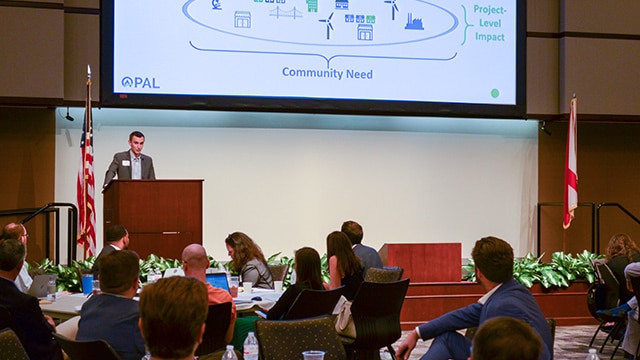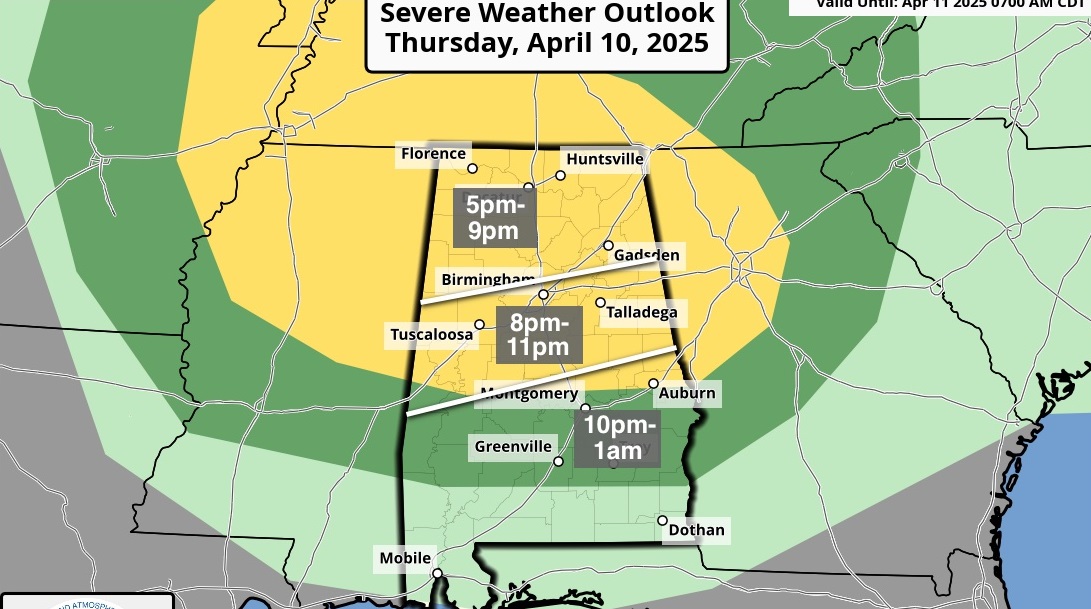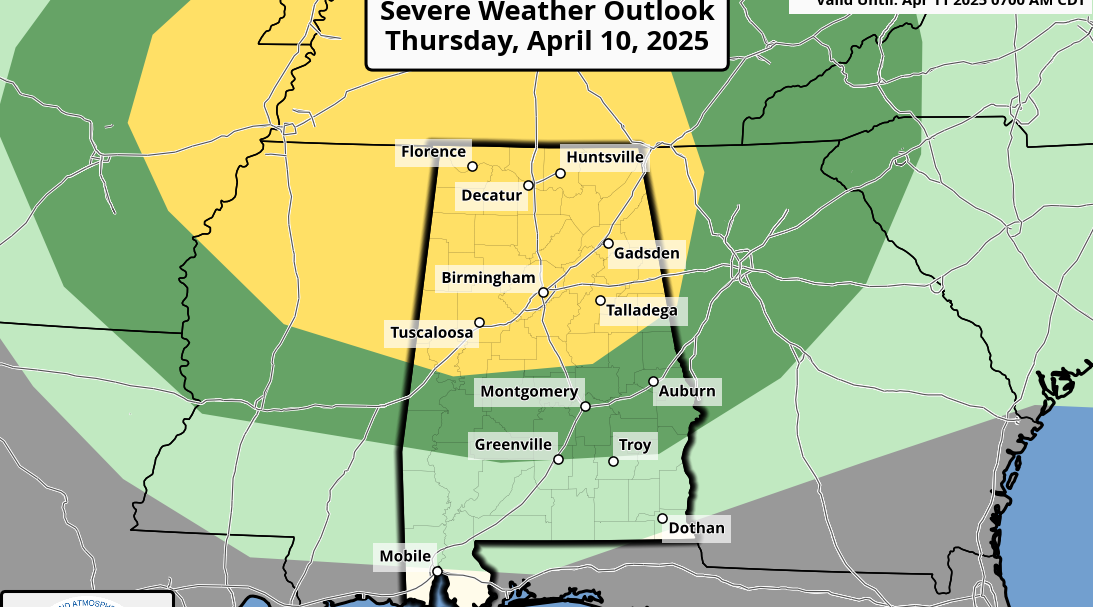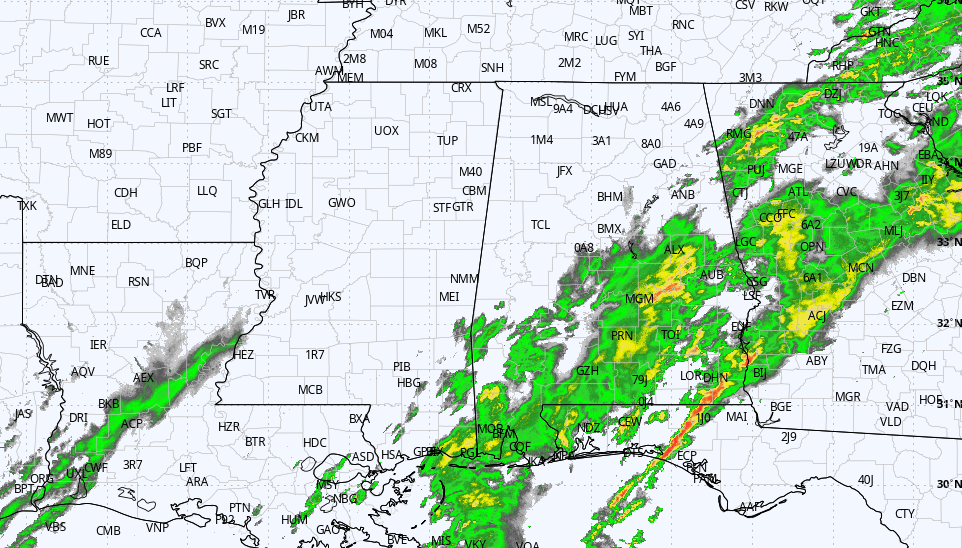Efforts being made to ensure Opportunity Zones benefit all of Alabama

Alex Flachsbart, founder and CEO of Opportunity Alabama, speaks last year at a summit about taking advantage of Opportunity Zones in the state. (Michael Tomberlin/Alabama NewsCenter)
Opportunity Zones have the potential to benefit a wide swath of Alabama – from poor urban areas to rural places in need – but only if the state has a plan to maximize the use of this new tool.
That was the goal of a recent impact-tracking summit led by Opportunity Alabama and presented by Alabama Power and Shipt. The summit brought together experts from throughout Alabama and Opportunity Zone experts from across the country with the goal of using opportunity zones to benefit those areas that need them most.
Opportunity Zones are areas designated by each state that need investment in real estate, entrepreneurship and small businesses. Investments in those zones are subject to special tax benefits on investments and capital gains.
National experts say that Alabama is among the best organized and most focused states when it comes to recognizing how Opportunity Zones can be a game changer in economic development and opportunity. Much of that preparation is due to the work of Opportunity Alabama.
“There aren’t many places, in our experience, across the country where there is such interconnectivity between city and state partners,” said Peter Truog, founder of Cleveland-based The Opportunity Exchange. “And there’s not many places that we’ve seen that are as proactive about bringing together a lot of different people to tackle these problems. For those two reasons, I think there is a clear national marker on the map here in Birmingham and, more generally, in Alabama given the work that we’re all doing effectively here together.”
The Opportunity Exchange is a national network that aims to link together investors, project sponsors and community and economic developers to bring about mutually beneficial outcomes.
Alex Flachsbart, founder and CEO of Opportunity Alabama, said his organization is aligned with The Opportunity Exchange because of the shared goals of making sure everyone benefits from opportunity zone projects.
“Today we announced a partnership with The Opportunity Exchange, which is a national platform that helps us get projects to market quicker, more effectively and more impactfully,” Flachsbart said.
Groups seek to ignite economic opportunity in Alabama’s low-income communities from Alabama NewsCenter on Vimeo.
Flachsbart said recently passed state legislation helps keep Alabama out in front when it comes to recognizing the effect opportunity zones can have.
“We could not be more pleased with what the state has enacted,” he said. “The state of Alabama was the first state in the country to put in place a comprehensive impact-aligned incentive program for opportunity funds.”
That program, which will be overseen by the Alabama Department of Economic and Community Affairs, will help determine when opportunity zone projects are having the desired impact on low- and moderate-income communities.
“These are communities that typically have been disadvantaged and have received less attention and less investment,” said Anthony Hood, director of civic innovation for the office of the president at UAB. “We need to make sure that it’s done in a way that benefits the entire community and not just the investors that have the capital gains to be able to put into these communities. We need to make sure that there is going to be social impact in addition to the financial impact that, certainly, the investors need to recoup.”
But how do you know if there is a social impact from opportunity zone investment?
“Things like job creation, removal of blight, workforce development, affordable housing. Could there be educational opportunities for college students – whether they are two- or four-year colleges, as well as our K-12 systems,” Hood said. “There are a lot of different ways where, if done right and if done in partnership with the stakeholders in our communities, this can be an amazing, amazing opportunity for some of our urban areas as well as some of our rural areas.”

Alex Flachsbart, founder and CEO of Opportunity Alabama, said Alabama has been among the most proactive states when it comes to Opportunity Zone legislation. (Michael Tomberlin/Alabama NewsCenter)
Flachsbart said that was the main takeaway he was hoping for from the first impact-tracking summit.
“The point of today’s gathering was to draw incredible national talent here to Birmingham to interact with people who are here on the ground actually making opportunity zone investments, running opportunity zone funds and sponsoring opportunity zone projects,” Flachsbart said. “The beauty of today was we had a chance to see from both lenses – from the practitioner side and then ultimately from the thinker side – how we can meet in the middle to come up with a framework that works for people who are actually doing this but for people who are ultimately pushing this in the halls of Congress and in the halls in Montgomery.”
While much of the emphasis until now has been on how investors can benefit from opportunity zone investing, the real goal of opportunity zones has always been to elevate the neediest areas.
“Ever since this legislation was first passed, there’s been this question around ‘What will the impact of the program be and how can we collectively work together in a way that does everything possible to make opportunity zone investments live up to their promise?’” Truog said.
Chris Slevin is vice president of the Washington, D.C., Economic Innovation Group, which has worked with opportunity zones since the concept originated.
Slevin said Alabama is showcasing what can be done in an urban setting. The opportunity zones in rural parts of the state have their own challenges.
“Already we’re seeing change in Birmingham, where vacant properties are now being put to productive use, going on tax rolls,” Slevin said. “There are a lot of questions as to best figure this out, particularly for rural communities, that are a little tougher to organize sometimes just by nature of the geography, but have real needs and a real scarcity of investment. Hopefully, this is one conference of many of how we can build relationships and new networks and try to bring capital into these places.”
Hood said he left the impact-tracking summit encouraged.
“You’ve got some of the smartest people in the country that convened on Birmingham for a day and a half that built networks and put their minds together around ‘How do we make sure that opportunity zones are being rolled out in an equitable manner?’” Hood said. “We have a focus on inclusive growth and then also making sure that we’re tracking social impact and reporting that out to the people that need it the most.”
Flachsbart was also encouraged.
“There is a lot of momentum,” he said. “We have a pathway now toward using this program the way that it was intended, which is to truly create jobs and to grow the region’s economy.”





